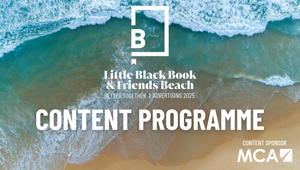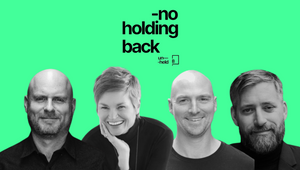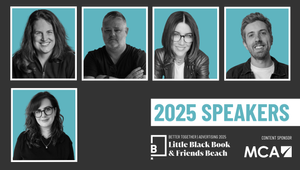
Meet the Global Indies Not Held Back By Red Tape or "Profits or Politics"

Welcome to ‘No Holding Back…’ a series championing a changing industry dependent on independence. With no holding group backing them, or holding them back, this series will explore the triumphs, opportunities, and challenges for the next generation of indies.
Told through those that work for them, with them, and even against them, it is an unfiltered perspective on the creative businesses at the forefront of our industry.
No Holding Back is brought to you by un-held, the un-holding co. helping indies scale without a sale.
--
Independently-owned shops are the best place for big ideas. That’s the promise indie agencies across the world are aiming to deliver on this year, as they aim to capitalise on “the financial crunch” holdcos are feeling, and the fact marketers are desperate for agencies that truly champion creativity.
The CMO of Australian telco Telstra, Brent Smart, is one such marketer. Hot shop Bear Meets Eagle on Fire is the centrepiece of his bespoke agency model, +61. As he tells LBB, “It’s about being independent. What you really need from a creative partner is a point of view and that point of view is stronger if it is truly independent and doesn’t let things like profit or politics get in the way.”
Laura Jordan Bambach launched Uncharted in London a little under a year ago, alongside Hannah Hattie Matthews and Fern Miller, with an ambition to put “creative culture and energy” in the centre.
“In a lot of the bigger places now, you've got the machine, and then the creativity is a layer on the top, or a nice-to-have on the top, rather than being the core,” she says.
“We've sort of done that to ourselves as an industry, I think, partly by measuring the wrong things, partly by the growth of procurement, who can be great, but also can be a pain in the bum.”
The time was right for Uncharted because “the competitive advantage of being big doesn't exist as much as what it used to.”
“There are some great big agencies doing big ideas, but I think they have a lot more in common with the small agencies than the current cut of big agencies that seem to be really dominating the market.
“That has to do with feeling like you're in a safe space, with an identity, with a creative culture, with a creative community, where there is a personality to the agency and the business, so that you get a really strong sense of what the work is like. That is where the best ideas come from. And at the moment, a lot of those places are the small agencies, because the big ones have all been smooshed together into a hot mess.”
Suzanne Barbosa, partner and managing director at Atlantic New York, agrees indies are incubators for “big and impossible ideas, and they're showing that they're possible with a small, tight-knit team.”
“Small and independent agencies are bringing a focus and energy to creativity and craft, in a way, honestly, that I think the industry was sorely missing and sorely needs,” she adds.
“Small agencies are just inherently the type of environment where big ideas are born and nurtured and protected and then produced. That mindset at a small agency, it's like, protect those big ideas at all costs. And so that's where big ideas are really finding a home.
“I actually think it's brewing this type of revolution in what advertising and what this industry needs to be.”
Margie Reid, the CEO of Australian and New Zealand indie Thinkerbell, has a different view. With a headcount of almost 200, she doesn’t see independence necessitating smallness.
“We do feel a sense of dismay every time an indie agency starts up and says ‘We’re small, therefore we are good.’ They are simply limiting their own growth.” What matters more than size is “business vision and model,” she says.
The global industry speculates Omnicom’s acquisition of IPG will lead to a slew of new independents cropping up, led by senior executives who find themselves in duplicative roles. Publicis merging Publicis Worldwide with Leo Burnett to create Leo hasn’t quietened those claiming 2025 will be the year of the indies.
At the very least, it will be the year Ari Weiss’s agency Quality Experience builds on a reel now led by a highly-crafted horror film, ex-adam&evers Rick Brim and Martin Beverley officially launch their venture with McCann’s Polly McMorrow, and The Monkeys Melbourne’s Ant Keogh, Paul McMillan, and Michael Derepas reveal the details of their new agency.
The trio should do well; Ari’s Quality Experience is also led by a CEO, CSO, and CCO combo. He says it’s “a very potent group” that clients don’t consistently have access to in networks.
“It's harder to get that group together, surprisingly, in these big networks,” Ari says.
“They exist, of course, the great talent exists in these networks, it's just harder to get them dedicated. So if you're pulling someone from London, or you're pulling someone from Australia, or you're pulling someone from Brazil, it's amazing, and the talent is phenomenal, but are you going to get their full attention?
“We'd get lucky and we'd pull that group together in a moment's notice, but we couldn't always pull that group together. And now we can.”
The pandemic gave clients permission to experiment with their rosters. As Suzanne puts it, big brands across every category were forced to adopt a challenger mindset, which meant looking to challenger agencies. “For a long time it was always, small always feels small. Now, it's showing that big things do come from being small.”
Ari argues it’s taken longer for the trend to emerge in the US. While Mischief burst onto the scene in 2020 as a response to founder Greg Hahn’s redundancy - “They really started out of a pretty shitty situation, and Greg maximized it and turned it into a lovely operation that has a fantastic culture and does really nice work” - the freelance market is much stronger than it is elsewhere.
“It's a bigger pay to play mentality, and you have such a robust freelance community in the US that freelance just makes a lot of sense for a lot of individuals who might otherwise start their own agency.”
Highly-Crafted, Effective Work Without the “Red Tape”
Ari would be lying if he said he didn’t consider that Quality Experience’s first piece of work had to do a brand-building job not just for the client, but for the agency. “Be prepared to sell anything you're willing to show, and if you're willing to show it, it better be phenomenal.”
Luckily for him, home gym brand Tonal “picked really smart work for their particular problem, and then we were able to craft the heck out of it”: a two-minute, visually-striking, horror-esque film shot on one of the world’s rarest cameras. Making something of that length and calibre “for a relatively small budget” required maxing out the “favour bank.”
“If I'm being really honest,” Ari says, “probably the degree to which we got favours pulled is just greater in an independent than it is a big multinational.”
While Quality Experience has an agency-of-record (AOR) relationship with Tonal, Atlantic’s Suzanne notes being independent means taking on a lot of project-based work.
“We come from this background of 'AOR is king'. And honestly, we really do love building brands over time. But sometimes these projects with brands, they need a little bit of that work and we come in really laser-focused, they have access to really senior talent, especially from the leadership team at the agency. We're in it with them.
“And then we don't go away. There's no closing of the curtain. We're there and we're available, and they really feel us throughout the relationship and the process.”
She cites the agency’s work for Blockbuster as some of its best. ‘Until the Bitter End’ was a Super Bowl ad that wasn’t aired during the big game, but instead released on VHS and played in the last Blockbuster in the world, in Bend, Oregon, at a Super Bowl watch party.
The video store unsurprisingly didn’t have much of a budget. And so the agency asked, ‘What are the big brands with the big budgets doing?’ and did the opposite. “We call it the counter current.”
“We went from coming up with the idea to shooting it and getting it to the store to produce in a matter of weeks,” Suzanne says.
“If we were a bigger agency or it was creative by committee, I truly think it would have been like red tape barrier, ask for permission, 'Can we do this?’, ‘How do we go about this?' For us, it was really simple.”
Both Suzanne and Ari note the effectiveness of the Blockbuster and Tonal work, respectively. The Blockbuster campaign had 9x the viewership than that of a Super Bowl ad. And the Tonal work beat previous campaigns by “over 200% from a sales goal perspective.”
“To have work that's not only that powerful and engaging, but also that effective and efficient is really a goal of ours,” Ari adds. After all, “We don't want to make art for art's sake, we're not in the museum business.”
Thinkerbell frequently releases fast-turnaround OOH, welcoming first Taylor Swift, then Travis Kelce, to Sydney for Vegemite and Toohey’s, respectively, celebrating May the 4th with ‘Hahn Solo’, and spruiking Menulog having “more beef than Kendrick and Drake”. Most famously, in 2019, it revelled in a tongue-in-cheek war between client Vegemite and UK counterpart Marmite, tying into England and Australia’s Ashes rivalry.


CEO Margie says that work took less than 24 hours, thanks to “excellent processes” and “close relationships with our clients.”
Meanwhile in London, Uncharted created ‘Women Are Watching’ for White Ribbon Alliance, featuring 300 stories from women across Kenya, Indonesia, Nepal, Nigeria, and Uganda to highlight maternal and reproductive health issues. Laura says Uncharted built a global team of makers within 48 hours to “deliver an idea that was a proper global idea … a lot of our clients haven't been UK clients. They've been global clients or EMEA clients.”

Her favourite work of 2024 though, “absolutely hands down,” came from an indie in her native Australia: Bear Meets Eagle on Fire (BMEOF) and +61’s body of work for telco Telstra. “That’s down to a big business wanting to really embrace doing stuff differently and embrace great creative work.”
Telstra CMO Brent says the work isn’t great because BMEOF is small, but because it’s independent.
“It’s about being truly creatively led. A culture, philosophy and way of working that puts the work first. Lots of agencies say that they are all about the work, but they prioritise other things.”
Creative energy and excellence is what Brent gets from BMEOF. “They don’t feel like a small agency because their ambition is huge. In the end, Micah [Walker, founder] and his team just care harder.”
Margie at Thinkerbell agrees clients like Brent “are turning to independents for confidence in their creative output,” and "confidence and security", especially when a founder’s reputation is at stake.
“Founder-led businesses, and people with a financial stake in the business, means that business is likely to be more committed to servicing clients at the right level as it’s their name on the line.”
Taking Big Swings on New Business, Models, and Acquisitions
The big ideas aren’t limited to client work. In 2023, Atlantic offered a car service to marketers travelling from Nice airport to Cannes, so long as they’d hear the agency’s pitch on the ride. It led to a new client.
Last year, Atlantic tried something different: inviting clients to pitch them at a two-star hotel. That led to a brief. Suzanne had other agencies telling her they were jealous of the ideas, which aimed to disrupt “honestly, outdated or stagnant new business processes.”
Beyond the Cannes stunts, the agency rarely pitches, and instead invites clients to a RFT - not a request for tender, but a request for test to try Atlantic’s services out and decide whether to engage the agency longer-term.
When it does pitch, Atlantic asks a brand to pay for its time - “We really believe in that. It is time that the agency is investing and inputting, and how do we rightsize that throughout this process?” - and asks questions like, “Why are you bringing us? What do you want from us that maybe you don't feel you are getting?”
“Big agencies, they do these big pitches. It's incredibly costly,” Suzanne explains.
“We're small, we can't compete with a big holding company pitch team of 30 people. Every penny is accounted for at a small agency, and we care so much about everything we do. And so we have to think a little bit outside the box.
“We have a very straight spine in terms of what we believe we will do, what our values are, but also what we believe we can offer.”
Clients have respected, and rewarded, that straight spine. Atlantic introduced a summer break last year, and communicated with a client pitching that the entire agency would be offline. “They didn't bother us. They didn't ask to meet on stuff.”
“The day we got back, at like 9:02am, they were like, 'Hey, we know you're back today. Congratulations, you won'. They're like, 'We couldn't wait to tell you.’”
Uncharted has a very small core team in London, and a network of 60 people from around the world - designers, strategists, poets, musicians - who they draw upon to create bespoke teams for clients. It’s similar to the ‘hub and spoke’ model used by Australian indie Supermassive, run by three ex-Havas execs.
“Our youngest person is 17, and the oldest person is in his 70s,” Laura notes, adding the agency doesn’t charge for time.
In 2023, Thinkerbell bought back a 10% stake held by consulting firm PwC. “One of the conditions of the buy back was that they had to take us to Luna Park for the day,” Margie quips.
The agency’s proposition is ‘Measured Magic’, so its office lobby gives visitors a choice of two doors through which to enter: Measured, or Magic. It launched a water brand, Water Can last year (Mother London has Mother Goods, a creative incubator for product development).
Thinkerbell also has a ‘Pot of Gold’ program to fund ideas staff are passionate about, from an exhibition about the Rwandan genocide to Thinkerbell Records or a coffee table book of photographs of late-night kebab shops.
In October, it defied expectations again: instead of being acquired, it acquired, buying fellow indie Hardhat to build out its customer experience capability. Yet Margie disagrees that such business moves are big swings - to not be interesting would be riskier.
“Taking big swings is not how you grow a business, ours, or the clients’. Having your feet on the ground and knowing how marketing and creativity works means being really really creative is the safest thing you can do to achieve business growth.”
Will the Momentum Last?
It’s not Laura’s first run at building an indie. She spent almost seven years as founding partner and CCO at Mr. President. The market momentum she felt back in 2013 has come back around, she says.
“It felt like there was a lot of movement there and a lot of energy. Then it really died down a little bit. And I know that it was mostly the holding companies that were winning all the pitches.”
She points to strong UK indies who have stayed the course like Pablo, Wonderhood, and Neverland. “Uncommon still acts like an indie,” she says of the renowned agency sold to Havas in 2023. “Hopefully that will continue. They've been an amazing success story, down to brilliant creative work and having something that they stand for.”
After selling adam&eve to DDB, founders James Murphy and David Golding eventually founded New Commercial Arts in 2020, then sold again. In September, it became part of WPP’s Ogilvy.
Ari says it’s a cycle that plays out in every market. Right now, the tides favour independents, but they’ll change again. He gives it a few years.
“It's a lovely time for independents. The financial crunch that all the larger holding companies are feeling gives a little bit more freedom and a little bit more liberation to the independents,” he explains.
“The next handful of years are well set up for the independents. And then the larger holding companies will become flush with cash again, as they always do, and they'll want to buy up the independents at that point, which they always do.
"I would love to stay independent forever, but we'll see. We'll see how it goes. The ebb and flow of this business is really interesting. And we're in a moment where independents are really favorite as far as creativity is concerned.”
Ari might want to stay independent, but he doesn’t want to stay small. The goal? “It is kind of world domination, I guess.” The team will “bite off what we can chew each year as we grow,” but he enjoyed the scale DDB offered him too much.
“So that's something that I would like to offer down the road, for sure. We want to master this market first. That's certainly the goal first. When a client comes to us and asks us to open an office in London, or Sao Paulo, or where have you, I think we would certainly say yes, as long as they were of similar vision and ambition.”
--
Top image (L-R): Ari Weiss, Margie Reid, Brent Smart, Suzanne Barbosa, Laura Jordan Bambach













